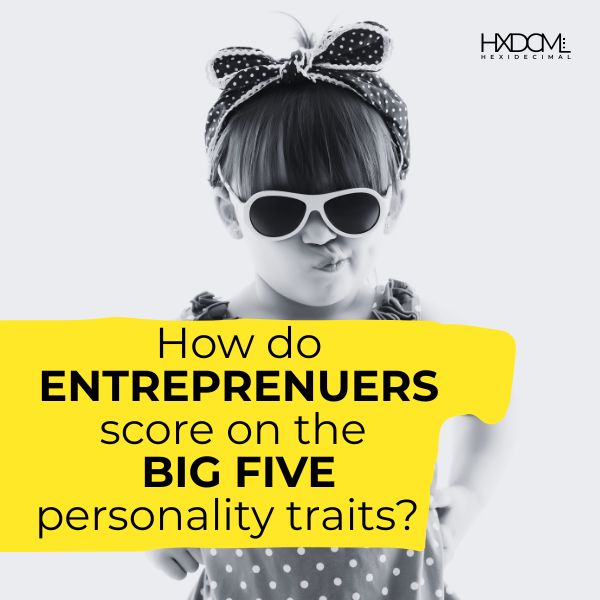What Science Says About the Founder Mindset
The Big Five Personality Traits of Entrepreneurs
What makes an entrepreneur truly successful? It turns out, it’s not just hustle or a brilliant idea—it’s their personality. Beyond ambition and work ethic, certain psychological traits appear again and again in founders who successfully launch and scale businesses. According to a landmark cross-national study by Obschonka et al. (2013), there is a consistent personality profile that shows up in entrepreneurs around the world. This article breaks down the research, the Big Five traits involved, and how they translate into real-world founder behavior—offering a powerful lens for founders, investors, and teams to better understand the entrepreneurial mindset.
TABLE OF CONTENTS
1. What Is the Big Five Personality Model?
2. The Entrepreneurial Personality Prototype (Obschonka et al., 2013)
3. What These Traits Look Like in Real Life
4. Why This Matters for Founders, Investors, and Teams
What Is the Big Five Personality Model?
The Big Five Personality Model, also known as the Five-Factor Model of Personality, is a leading psychological theory used to describe and assess human personality. It defines personality through five broad and measurable traits, which are consistent across time, cultures, and populations.
These five traits are:
Openness to Experience
Describes how imaginative, curious, and open a person is to new ideas, experiences, and ways of thinking. High openness is often linked to creativity and innovation—traits frequently found in entrepreneurs and startup founders.
Conscientiousness
Reflects how organized, responsible, and goal-oriented someone is. Individuals high in conscientiousness tend to be disciplined, detail-focused, and dependable—making them well-suited for executing long-term business plans.
Extraversion
Measures a person’s sociability and assertiveness. Those with high extraversion are typically outgoing, energetic, and comfortable leading or interacting with others—critical qualities for pitching, networking, and team building.
Agreeableness
Indicates how cooperative, compassionate, and team-oriented someone is. While agreeableness is important for collaboration, successful entrepreneurs often balance this trait with the ability to challenge ideas and push boundaries.
Neuroticism
Assesses emotional stability and resilience. Low neuroticism (or high emotional stability) is often seen in founders who remain calm under stress, make clear-headed decisions, and recover quickly from setbacks.
The Big Five traits provide a scientifically validated framework to better understand entrepreneurial personality traits and why certain individuals excel in high-risk, high-reward environments like startups.
The Entrepreneurial Personality Prototype (Obschonka et al., 2013)
In their research published in the Journal of Personality, Obschonka et al. (2013) analyzed data from over 10,000 individuals across Germany, Australia, and the United States. The goal? To identify whether a specific personality profile could predict entrepreneurial status—and it did.
Their findings revealed that entrepreneurs consistently scored:
-
High in Openness to Experience
-
High in Conscientiousness
-
High in Extraversion
-
Low in Neuroticism
-
Low to Moderate in Agreeableness
This cluster of traits became known as the entrepreneurial personality profile.
What These Traits Look Like in Real Life
High Openness to Experience
Entrepreneurs with high openness are imaginative, curious, and willing to explore the unknown. They’re often the ones testing new technologies, launching side projects, or finding creative ways to solve problems.
High Conscientiousness
This trait reflects discipline, organization, and goal-setting. Founders who score high here are likely to build systems early, manage their time efficiently, and follow through on complex strategies.
High Extraversion
Entrepreneurs with high extraversion thrive on energy, communication, and networking. They’re comfortable pitching investors, leading teams, and connecting at events.
Low Neuroticism
This means greater emotional stability. Entrepreneurs in this category tend to remain calm under pressure—essential when launching a startup full of unknowns and obstacles.
Low to Moderate Agreeableness
Contrary to popular belief, being “too agreeable” can actually hinder entrepreneurship. Founders often need to question norms, negotiate tough deals, and push back when necessary.
Why This Matters for Founders, Investors, and Teams
Understanding the personality profile of successful entrepreneurs can help with:
-
Self-assessment for aspiring founders
-
Team-building and co-founder alignment
-
Investor evaluations of startup leadership
-
Leadership development and coaching strategies
This data-driven insight shows that innovation is not only about what you build—but who you are while building it.
Final Thoughts
While personality is not destiny, the Big Five traits offer a powerful lens for understanding the entrepreneurial mindset. The Obschonka study is a reminder that the road to startup success often starts with self-awareness—and the right mix of traits may just give founders the edge they need.
CONTACT HXDCML
OR FILL OUT THE INFORMATION BELOW
– Brand Identity
– Website Development
– UI/UX Design
– SEO Strategy
– Scalable Technology Stacks
– Digital Presence Established
– Strategy and Planning
– Business Growth Solutions
– Content Creation
– Marketing setup
– Social Media Branding
– Fixed-Price Solutions





